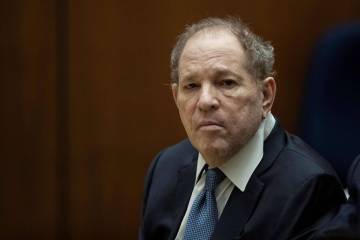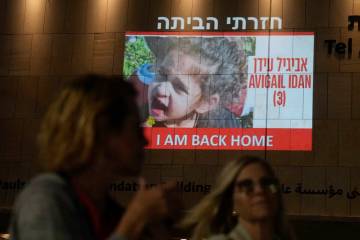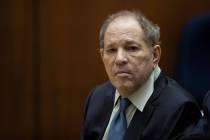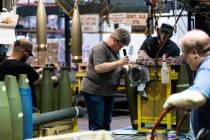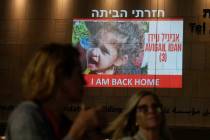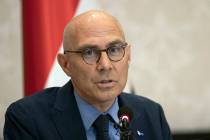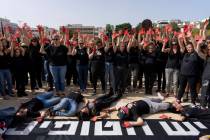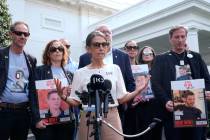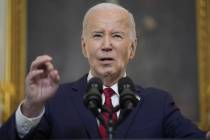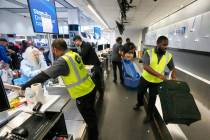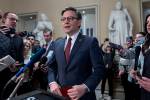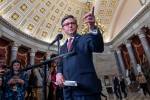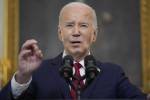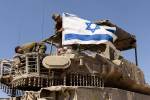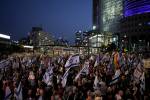South Korea appears willing to lift some sanctions against North
SEOUL, South Korea — South Korea is considering lifting some of its unilateral sanctions against North Korea to create more momentum for diplomacy aimed at improving relations and defusing the nuclear crisis, the South’s foreign minister said Wednesday.
During a parliamentary audit of her ministry, Kang Kyung-wha said the government is reviewing whether to lift sanctions South Korea imposed on the North in 2010 following a deadly attack on a warship that killed 45 South Korean sailors.
South Korea then effectively shut down all cross-border economic cooperation except for a jointly run factory park in the North Korean border town of Kaesong, which was shuttered in February 2016 after a North Korean nuclear test and long-range rocket launch. The so-called “May 24 measures” of 2010 also banned North Korea from using shipping lanes in South Korean territory.
A move by South Korea to lift its unilateral sanctions would have little immediate effect since U.S.-led international sanctions remain in place. But it’s clear the South’s liberal government is preparing to restart joint economic projects if the larger nuclear negotiations between the United States and North Korea begin yielding results.
“Many parts of the May 24 measures now duplicate with the United Nations sanctions (against North Korea),” Kang said. “As negotiations continue to improve ties between the South and North and achieve denuclearization, there’s a need to flexibly review (lifting the measures) as long as it doesn’t damage the larger framework of sanctions against the North.”
South Korean President Moon Jae-in has described inter-Korean engagement as crucial to resolving the nuclear standoff. A large number of South Korean business leaders accompanied Moon last month to Pyongyang, North Korea’s capital, where he and leader Kim Jong Un agreed to normalize operations at the Kaesong factory park and resume joint tours to North Korea when possible, voicing optimism the international sanctions could end and allow such projects.
The North and South also announced measures to reduce conventional military threats, such as creating buffer zones along their land and sea boundaries and a no-fly zone above the border. The North also said it would dismantle its main nuclear facility in Nyongbyon if the United States takes unspecified corresponding measures.
Despite the current mood of detente and negotiation between the Koreas, the removal of sanctions will be a difficult decision for Seoul’s government.
South Koreans are deeply divided along ideological lines and many people still harbor deep anger over North Korea’s 1950 attack that started the Korean War, killing and injuring millions. There has been occasional bloodshed ever since — the 2010 attack on the warship was followed months later by North Korea’s shelling of a South Korean border island that killed four and gutted homes.
Kang’s comments drew an angry reaction from conservative opposition lawmakers. Chung Jin-suk of the Liberty Korea Party demanded that Moon’s government consult with the families of the sailors who died in 2010 before making any decision on sanctions. Kang’s ministry later tried to downplay her comments, saying in a statement that no decision was imminent.
During her conversation with lawmakers, Kang described Seoul’s unilateral sanctions as a key obstacle in restarting South Korean tourism to the North’s Diamond Mountain resort, which was suspended in 2008 following the shooting death of a South Korean woman there.
But the removal of such sanctions wouldn’t be enough to get the tours back on, said Koh Yu-hwan, a North Korea expert at Seoul’s Dongguk University and a policy adviser to Moon. While U.N. sanctions against North Korea don’t ban tourism, they do place strict restrictions on the transfer of funds, he said. Still, the lifting of the 2010 sanctions could offer at least some tangible benefits to the North.
“For North Korea, the most meaningful result from the lifting of the May 24 measures would be that its ships will be able to travel through Jeju Strait again,” said Koh, referring to waters between South Korea’s mainland and the southern island of Jeju. “This will allow them to save time and fuel.”
As part of the agreements reached during Moon and Kim’s meetings, a liaison office between the countries opened in Kaesong last month. Seoul’s Unification Ministry said Tuesday that water being supplied to the office is being provided to the town’s residents as well.
Using a facility that draws from a reservoir near the factory park, South Korea has been pumping 1,000 to 2,000 tons of water to the liaison office and about 15,000 tons to the rest of the city every day, ministry spokesman Baik Tae-hyun said. He said the resumption of the water supply does not violate sanctions.
The closure of the factory park had deprived Kaesong residents of what had been a steady supply of water and electricity. South Korea is providing electricity to the liaison office, but not to the town’s residents.
“There are also humanitarian considerations as the residents of Kaesong have to rely on the park’s facility for water,” Baik said. “This has nothing to do with restarting the Kaesong factory park.”
Other moves by the Koreas to reduce tensions include temporary reunions between war-separated relatives and military agreements that call for reducing weaponry and guards at the border and demining sections of the Demilitarized Zone.




